Bottom line: Asking before telling can spark curiosity, engagement, and action.
19.09.2025 19:13 — 👍 0 🔁 0 💬 0 📌 1
Why does this matter? Sharing info as facts is the current standard. During the pandemic, the WHO shared info exclusively in PSA format. Switching to an FAQ could have critically shaped the public’s attention.
19.09.2025 19:13 — 👍 0 🔁 0 💬 1 📌 0
And in social media ads about COVID-19 vaccines, Q&A-style ads got 9–11% more clicks per dollar than direct statements of fact.
19.09.2025 19:13 — 👍 0 🔁 0 💬 1 📌 0
Q&A-style messages also boosted self-reported adherence to public health guidelines in Michigan (e.g., self-reported social distancing)
19.09.2025 19:13 — 👍 0 🔁 0 💬 1 📌 0
Q&A-style health messages led to substantially more information seeking, leading people to deepen their knowledge about related topics (e.g., how to wear a mask properly)
19.09.2025 19:13 — 👍 0 🔁 0 💬 1 📌 0
We texted *the same facts* either directly (e.g., "Even if you're wearing a mask, you still need to stand 6ft from others to stay safe") or after teasing recipients with a question (e.g., "If you're wearing a mask, do you still need to stay 6ft from others to stay safe?").
19.09.2025 19:13 — 👍 0 🔁 0 💬 1 📌 0
We ran large field experiments in Ghana and Michigan (with ~50k participants total) testing the impact of information framing during the COVID-19 pandemic.
19.09.2025 19:13 — 👍 0 🔁 0 💬 1 📌 0
Does Q&A Boost Engagement? Health Messaging Experiments in the United States and Ghana | Management Science
What happens if you *ask* instead of *tell*? Turns out, teasing people with a question before sharing a fact can shape whether people engage with critical health information. Read our new paper in Management Science to learn more: pubsonline.informs.org/doi/full/10....
19.09.2025 19:13 — 👍 4 🔁 1 💬 1 📌 3
Huge thank you to MoreThanNow for facilitating this collaboration — this work would not have been possible without them!
17.06.2025 22:12 — 👍 1 🔁 0 💬 0 📌 0
Organizations hoping to increase the pipeline of women applying for leadership roles may benefit from ensuring women have access to sponsorship—and that they know it.
17.06.2025 22:12 — 👍 0 🔁 0 💬 1 📌 0
Instead, women seem to strategically respond to information about whether their environment is likely to support their aspirations, or not.
17.06.2025 22:12 — 👍 3 🔁 0 💬 1 📌 0
One implication? The gender leadership gap can’t simply be chalked up to preferences (e.g., women feeling a lack of ‘fit’ in leadership roles, or preferring to focus on work-life balance).
17.06.2025 22:12 — 👍 3 🔁 1 💬 1 📌 0
But diversity incentives serve as a (literally) costly signal of org support for gender diversity. So, they boost women’s expectations that they’ll receive critical sponsorship on the path to promotion. This, in turn, increases their willingness to be open about their leadership aspirations.
17.06.2025 22:12 — 👍 0 🔁 0 💬 1 📌 0
You might expect diversity incentives to backfire—it doesn’t feel great to question whether you were promoted on your own merits vs. because of your identity.
17.06.2025 22:12 — 👍 0 🔁 0 💬 1 📌 0
Women who were told that org execs were incentivized to boost the representation of women in leadership from 21% to 23% were 11+% more likely to indicate an interest in management than women told about the goal alone, or those who were simply reminded of their org’s commitment to gender diversity.
17.06.2025 22:12 — 👍 0 🔁 0 💬 1 📌 0
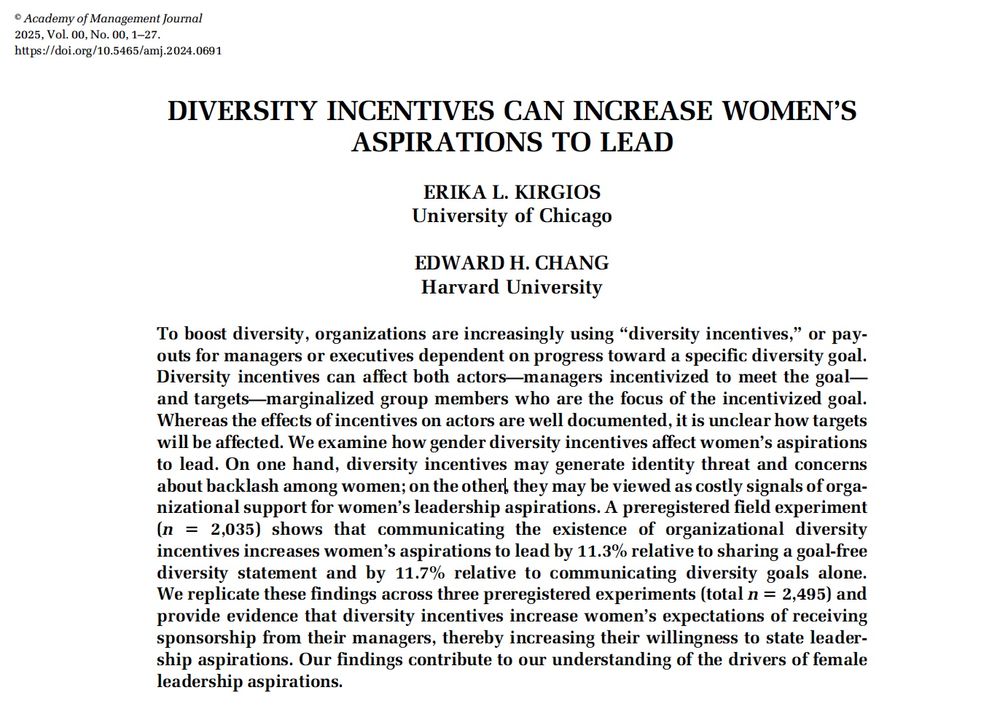
🚨NEW PAPER ALERT🚨 A field experiment w/ 2,035 female employees at a multinational engineering firm shows women are more willing to express an interest in leadership roles when their orgs implement diversity incentives. Read more about this joint work with Edward Chang in AMJ: doi.org/10.5465/amj....
17.06.2025 22:12 — 👍 8 🔁 1 💬 1 📌 0
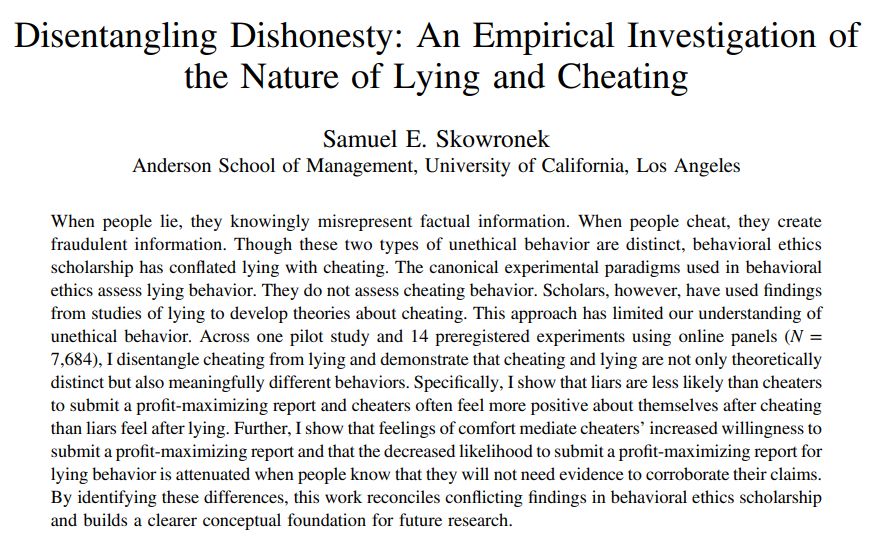
💢New paper alert💢
Dishonesty is everywhere — but it’s not all the same. My new solo-authored paper in Journal of Experimental Psychology: General disentangles cheating and lying as distinct forms of dishonesty.
Link to paper: doi.org/10.1037/xge0...
A thread 🧵👇
16.05.2025 23:30 — 👍 39 🔁 10 💬 1 📌 2

Advertising Measurable Hiring Goals Attracts a More Diverse Pipeline
Concrete language can attract underrepresented candidates, particularly in the current environment.
Concrete language can attract underrepresented candidates, particularly in the current environment, via Chicago Booth’s
@erikakirgios.bsky.social, University of Southern California’s @ikesilver.bsky.social, and Harvard’s Edward H. Chang. www.chicagobooth.edu/review/adver... #diversity
31.03.2025 16:47 — 👍 0 🔁 1 💬 0 📌 0
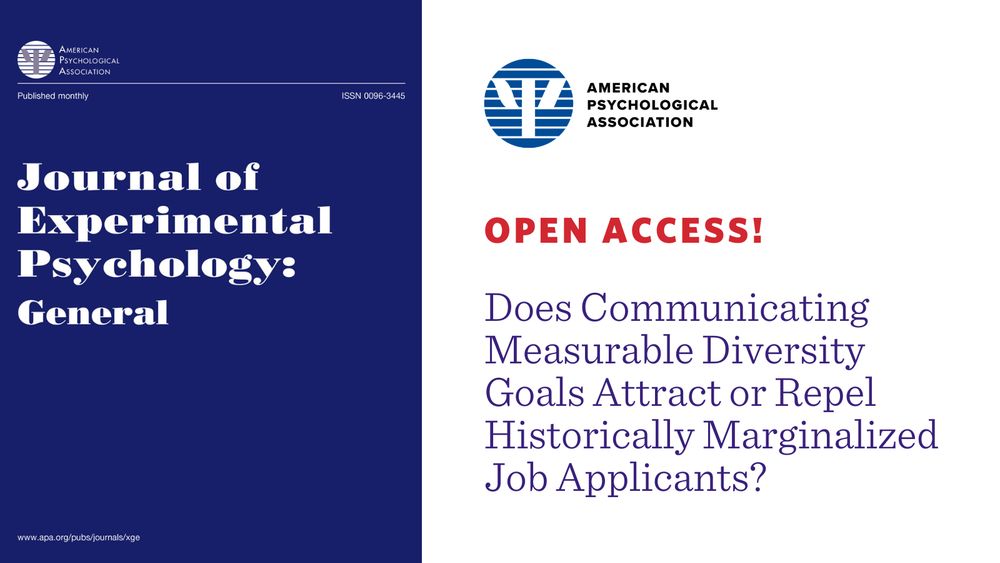
Research from @erikakirgios.bsky.social, @ikesilver.bsky.social, and Edward H. Chang suggests that measurable #diversity goals signal to marginalized candidates that they are more likely to be hired, belong, and encounter a genuine commitment to diversity at the organization bit.ly/3D4t3iB
24.03.2025 22:05 — 👍 0 🔁 1 💬 0 📌 0
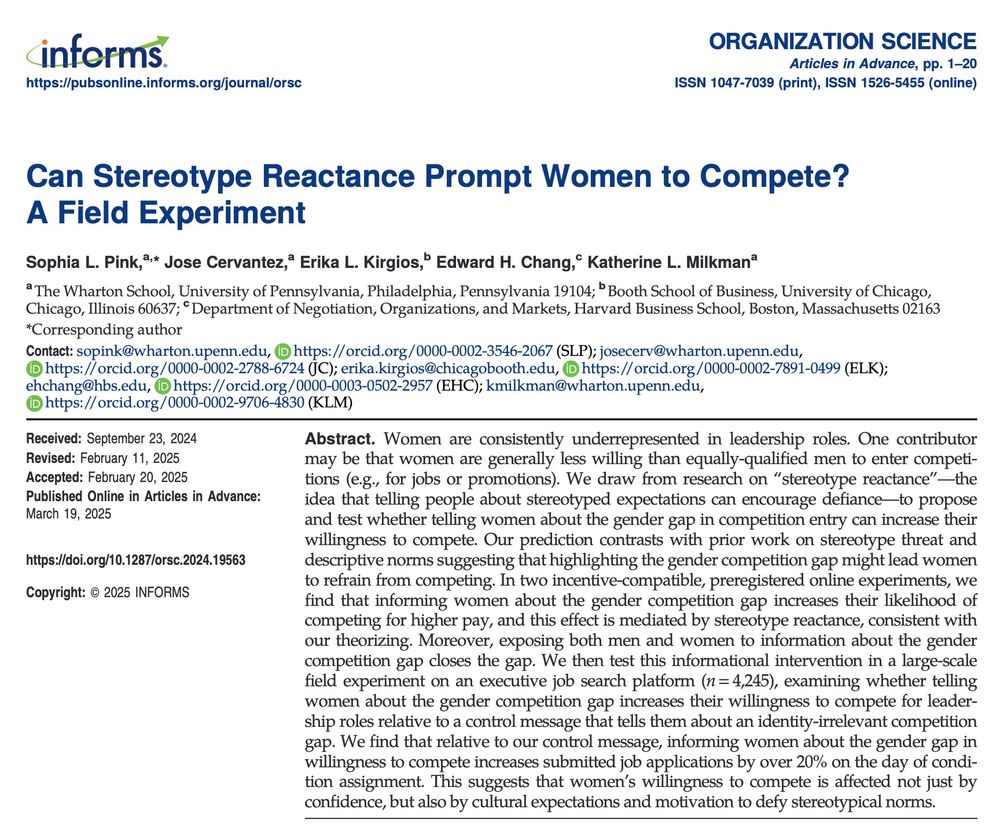
Screenshot of title + abstract of the paper.
🚨New paper alert!🚨
Women are less likely to enter competitions than men—even when equally qualified. But telling them this can change behavior.
📈 In a field experiment on a job application platform, we found that highlighting this gender gap increased the # of job apps women submitted by ~20%.
27.03.2025 14:36 — 👍 29 🔁 12 💬 2 📌 0
Interestingly, we find that diversity goals boost anticipated belonging—counter to prior theory. As organizations strip their websites of mentions of diversity entirely, this work highlights the value of clear signals of commitment to DEI for attracting highly qualified underrepresented candidates
16.01.2025 15:15 — 👍 2 🔁 2 💬 0 📌 0
This result is driven by White women, while we find null effects for URMs. But in the lab, both groups respond similarly. We explore possible explanations for this difference (including noise!) in the paper.
16.01.2025 15:15 — 👍 1 🔁 0 💬 1 📌 0
In a large-scale reverse audit experiment (n = 5,557), we find that women & racial minority job seekers were 6.5% more likely to apply when an org shared a measurable goal instead of a vague one, and this effect was strongest for highly qualified applicants (who were 11% more likely to apply).
16.01.2025 15:15 — 👍 2 🔁 0 💬 1 📌 0
One narrative suggests that measurable goals would feel tokenizing and alienating for marginalized candidates, who might expect to be used as a means to an end. The other suggests measurable goals might signal strategic benefits & genuine commitment to DEI. Which account dominates?
16.01.2025 15:15 — 👍 2 🔁 0 💬 1 📌 0
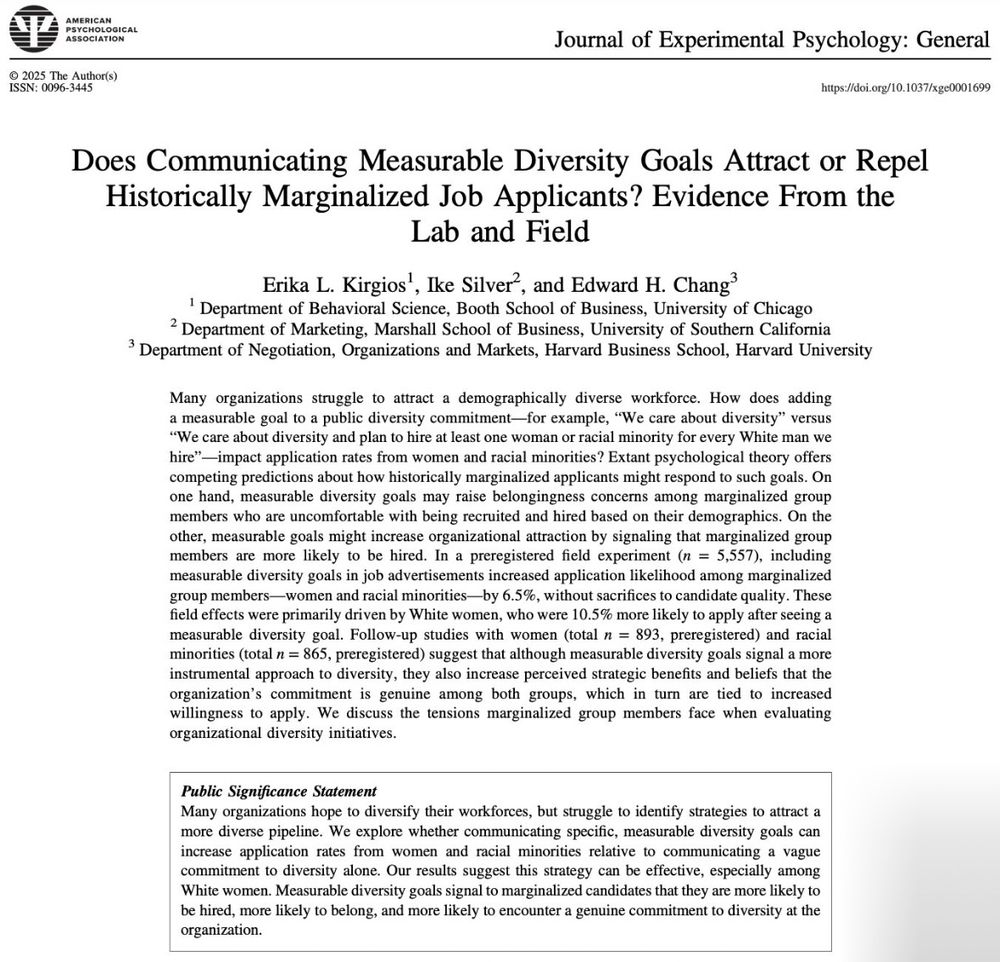
How do job seekers react when orgs quantify their diversity commitments? In a 🚨new paper🚨 with @ikesilver.bsky.social & Edward Chang, we explore competing predictions about how women and racial minorities react to measurable goals vs. vague, values-focused commitments.
16.01.2025 15:15 — 👍 28 🔁 13 💬 1 📌 1
🚨new paper alert🚨 @iamlindachang.bsky.social, @sendhil.bsky.social, @katymilkman.bsky.social, and I find that people systematically overweight numeric information in decision-making, a tendency we dub “quantification fixation”. Read more in Linda’s thread 👇
12.11.2024 18:39 — 👍 3 🔁 1 💬 0 📌 0
Thank you so much!
17.01.2024 16:04 — 👍 1 🔁 0 💬 0 📌 0
If you’re interested in behavioral science & want to gain some experience before applying for a PhD, consider applying to be my full-time pre-doc. Bonus: by applying to this job ad you can also be considered for a role with one of my incredible colleagues! www.chicagobooth.edu/-/media/facu...
16.01.2024 22:59 — 👍 9 🔁 5 💬 1 📌 1
Postdoc in the Behavioral Decision Making area at UCLA Anderson. I study ethical decision making and social norms.
The latest research, calls for papers, and news from journals published by the nonprofit American Psychological Association.
https://www.apa.org/pubs/journals/
PhD student at Wharton studying decision-making and behavior change.
www.sophiapink.com
🇬🇧 in 🇺🇸 | Assistant Professor of Finance at Rice University Jones Graduate School of Business | Tweets #HouseholdFinance + 🏏 | Chicago Booth PhD | Kent & England Cricket, Man Utd & England Soccer Fan www.benedictgk.com
(current) Columbia (Columbia Business School)
(previous) Princeton (School of Public & International Affairs)
(phd) Northwestern (Kellogg School of Management)
hwaldfogel.com
Assistant Professor of Marketing, University of Alberta | Wharton PhD '23 | Studying consumer behavior
Social psychologist, writer, speaker. Specializing in stereotypes and inequality. www.cydneydupree.com
Psych Prof • Co-EIC ASAP @SPSSI • multiple identities, allyship, immigration • GSW • opinions my own
Assistant Professor in Industrial-Organizational Psychology at Baruch College, City University of New York
Assistant Professor she/her. I study how people think about social relationships. Usually with babies and kids.
ashleyjthomas.com
Midwesterner, researcher, enthused about birds
Assistant Professor of Management at Georgetown McDonough. Research: conflict/collaboration, judgment and decision making, reputation, and emotion. charlesdorison.com
Research-driven insights on business, policy, and markets. A Chicago Booth publication. https://www.chicagobooth.edu/review
✉️ 👉 https://www.chicagobooth.edu/review/newsletter-sign-up
🎧 👉 https://www.chicagobooth.edu/review/podcast
Interested in moral psychology and polarization | Research professional at The University of Chicago | Incoming PhD student in consumer behavior at USC Marshall
Assistant Professor @ NYU Stern
I am an Economist leveraging the assignment mechanism in the field to test theory and help non-profits, govts, and anyone who will listen! My goal is to (hopefully!) change the world for the better. My picture is with my oldest son!
Wharton/UPenn Initiative led by @katymilkman.bsky.social & @angeladuckworth.bsky.social unites star #BehavioralScientists with organizations to advance the science of behavior change
bcfg.wharton.upenn.edu
Asst. Prof. of Marketing at Duke Fuqua. Research on repeat consumption & social influence
Associate Practice Professor of BeSci at Penn. Negotiation expert. Mom, traveler, diver.
Assistant Prof @ UW-Madison studying how we know what we know and what we don't know.
(she/her)





